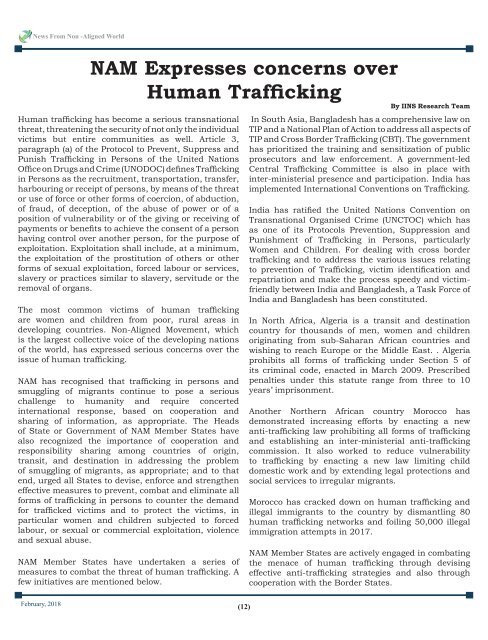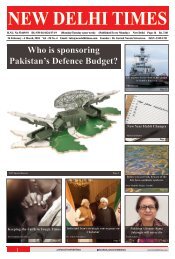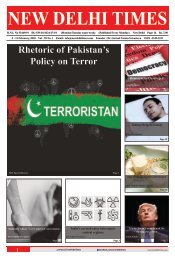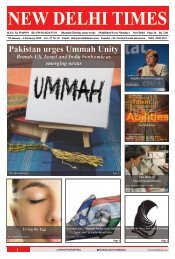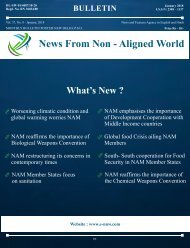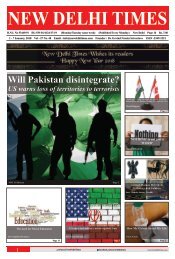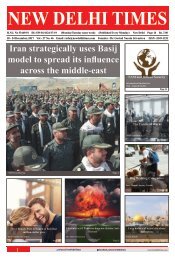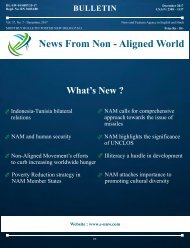10 february 2018_final
You also want an ePaper? Increase the reach of your titles
YUMPU automatically turns print PDFs into web optimized ePapers that Google loves.
News From Non -Aligned World<br />
NAM Expresses concerns over<br />
Human Trafficking<br />
By IINS Research Team<br />
Human trafficking has become a serious transnational<br />
threat, threatening the security of not only the individual<br />
victims but entire communities as well. Article 3,<br />
paragraph (a) of the Protocol to Prevent, Suppress and<br />
Punish Trafficking in Persons of the United Nations<br />
Office on Drugs and Crime (UNODOC) defines Trafficking<br />
in Persons as the recruitment, transportation, transfer,<br />
harbouring or receipt of persons, by means of the threat<br />
or use of force or other forms of coercion, of abduction,<br />
of fraud, of deception, of the abuse of power or of a<br />
position of vulnerability or of the giving or receiving of<br />
payments or benefits to achieve the consent of a person<br />
having control over another person, for the purpose of<br />
exploitation. Exploitation shall include, at a minimum,<br />
the exploitation of the prostitution of others or other<br />
forms of sexual exploitation, forced labour or services,<br />
slavery or practices similar to slavery, servitude or the<br />
removal of organs.<br />
The most common victims of human trafficking<br />
are women and children from poor, rural areas in<br />
developing countries. Non-Aligned Movement, which<br />
is the largest collective voice of the developing nations<br />
of the world, has expressed serious concerns over the<br />
issue of human trafficking.<br />
NAM has recognised that trafficking in persons and<br />
smuggling of migrants continue to pose a serious<br />
challenge to humanity and require concerted<br />
international response, based on cooperation and<br />
sharing of information, as appropriate. The Heads<br />
of State or Government of NAM Member States have<br />
also recognized the importance of cooperation and<br />
responsibility sharing among countries of origin,<br />
transit, and destination in addressing the problem<br />
of smuggling of migrants, as appropriate; and to that<br />
end, urged all States to devise, enforce and strengthen<br />
effective measures to prevent, combat and eliminate all<br />
forms of trafficking in persons to counter the demand<br />
for trafficked victims and to protect the victims, in<br />
particular women and children subjected to forced<br />
labour, or sexual or commercial exploitation, violence<br />
and sexual abuse.<br />
NAM Member States have undertaken a series of<br />
measures to combat the threat of human trafficking. A<br />
few initiatives are mentioned below.<br />
In South Asia, Bangladesh has a comprehensive law on<br />
TIP and a National Plan of Action to address all aspects of<br />
TIP and Cross Border Trafficking (CBT). The government<br />
has prioritized the training and sensitization of public<br />
prosecutors and law enforcement. A government-led<br />
Central Trafficking Committee is also in place with<br />
inter-ministerial presence and participation. India has<br />
implemented International Conventions on Trafficking.<br />
India has ratified the United Nations Convention on<br />
Transnational Organised Crime (UNCTOC) which has<br />
as one of its Protocols Prevention, Suppression and<br />
Punishment of Trafficking in Persons, particularly<br />
Women and Children. For dealing with cross border<br />
trafficking and to address the various issues relating<br />
to prevention of Trafficking, victim identification and<br />
repatriation and make the process speedy and victimfriendly<br />
between India and Bangladesh, a Task Force of<br />
India and Bangladesh has been constituted.<br />
In North Africa, Algeria is a transit and destination<br />
country for thousands of men, women and children<br />
originating from sub-Saharan African countries and<br />
wishing to reach Europe or the Middle East. . Algeria<br />
prohibits all forms of trafficking under Section 5 of<br />
its criminal code, enacted in March 2009. Prescribed<br />
penalties under this statute range from three to <strong>10</strong><br />
years’ imprisonment.<br />
Another Northern African country Morocco has<br />
demonstrated increasing efforts by enacting a new<br />
anti-trafficking law prohibiting all forms of trafficking<br />
and establishing an inter-ministerial anti-trafficking<br />
commission. It also worked to reduce vulnerability<br />
to trafficking by enacting a new law limiting child<br />
domestic work and by extending legal protections and<br />
social services to irregular migrants.<br />
Morocco has cracked down on human trafficking and<br />
illegal immigrants to the country by dismantling 80<br />
human trafficking networks and foiling 50,000 illegal<br />
immigration attempts in 2017.<br />
NAM Member States are actively engaged in combating<br />
the menace of human trafficking through devising<br />
effective anti-trafficking strategies and also through<br />
cooperation with the Border States.<br />
February, <strong>2018</strong><br />
(12)


